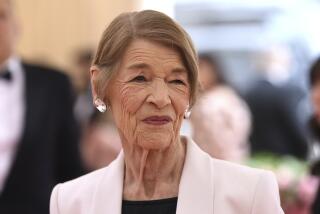Labor Party Maverick Sets Her Own Course
- Share via
LONDON — She snatched off her blond wig in public to expose a head left bald by treatment for a benign brain tumor. As Northern Ireland secretary, she stormed the notorious Maze prison to garner support for the peace process from Protestant gunmen. And when delicate negotiations broke down, she told Sinn Fein leader Gerry Adams to “get on and do it, otherwise I’ll head-butt you.”
Now the unpredictable Marjorie “Mo” Mowlam has sprung another surprise: an early retirement from politics. She will give up her parliamentary seat at the next election, expected to be held in spring.
The retreat of Britain’s best-loved Labor Party politician and one of the nation’s most prominent women in government leaves the field to a buttoned-down and mostly male cast that can be counted on to stay more consistently “on-message.”
Mowlam denied speculation that she is quitting over potshots from members of Prime Minister Tony Blair’s inner circle, despite her husband’s comment that “popularity isn’t always the most popular thing amongst colleagues.”
“This is my decision. It’s nothing to do with British politics,” Mowlam said, asserting good health and a hankering to do something else with her life at 50.
Blair-connected officials also denied any friction. But there is no denying that the outspokenness and unorthodox style that made Mowlam such a hit with ordinary voters also made her a loose cannon in the eyes of a government obsessed with crafting its own image.
She has a penchant for kicking off her shoes and padding around barefoot during official meetings. She has said that “unlike President Clinton, I did inhale,” and suggested that the monarchy might want to pack it in at Buckingham Palace and find modern quarters for a new century.
Fans and critics lamented the departure of such a frank voice.
While other politicians control “with almost scientific precision the amount of personality they project, to prevent any dangerous overflow,” columnist Libby Purves wrote in the Times of London, Mowlam displays a “devil-may-care individualism: There is nothing like a brush with death to stop you caring much about whether you are in trouble for going off-message . . . or the Daily Mail columnist is being rude about your weight.”
Mowlam, elected a Labor member of Parliament in 1987, was found to have a noncancerous brain tumor a decade later. After treatment, she took up the post of Northern Ireland secretary in the newly elected government.
She was enormously popular on the streets of the province, but her direct and sometimes colorful language offended the sensibilities of Protestant leaders, who were also unaccustomed to working with women. Her readiness to bargain with Roman Catholic nationalists cost her the trust of Ulster Unionist Party chief David Trimble, now the province’s first minister.
Mowlam’s popularity was a double-edged sword that could jab even her boss. At the Labor Party conference in 1998, Blair’s keynote speech was interrupted by a standing ovation--for Mowlam. As soon as he mentioned her name, the crowd went wild.
Mowlam turned to her fans for support in July 1999, when it was rumored that Blair planned to move her out of Northern Ireland in a Cabinet reshuffle.
“I have not had my fill of Ireland,” she announced, buying herself a few more months.
But Blair sidelined Mowlam from the bargaining table in Belfast, the provincial capital, and eventually replaced her with his buddy, Peter Mandelson. Mowlam--who even some friends acknowledge has a short temper and an inattention to detail--was passed over for the job of health secretary and, instead, put into the powerless post of Cabinet office minister.
Then the knives came out. Stories appeared in the press quoting unnamed officials as saying that her illness had dimmed her intellect. It seemed unlikely that Mowlam would get a Cabinet post if Labor won a second term.
And so she chose to bail, a premature departure that has underscored the disappointment many women feel with Blair’s “new Labor” government, and with its lack of powerful women despite the record number of female members elected to Parliament in 1997.
“Their attitudes to women are of a generation of broadly liberal men in their 40s and 50s who are convinced they are perfectly comfortable with female colleagues,” columnist Anne McElvoy wrote in the Independent newspaper this week, “yet somehow always manage to be surrounded by an inner coterie of males and in truth find all but the most compliant of women a bit of a chore to deal with.”
In the Express tabloid, Stephen Pollard said that women are relegated to marginal departments in the Blair government: “No woman has so far made it to the upper reaches of the Cabinet. Is there really not a single woman in the Labor Party capable of doing a top job?”
More to Read
Sign up for Essential California
The most important California stories and recommendations in your inbox every morning.
You may occasionally receive promotional content from the Los Angeles Times.













